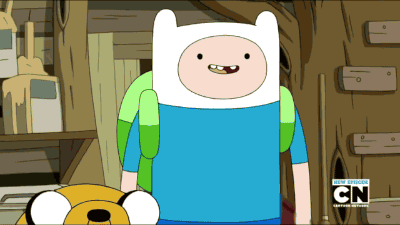Coping with adult angst in Adventure Time
The unnerving plot twist that concludes Adventure Time's (2010–current) 128th episode "Another Five More Short Graybles" is that there is no unnerving plot twist. After a series of coincidental mishaps only possible in the surrealist cartoon landscape that is Adventure Time, it is revealed that a time machine that Jake the Dog and Finn the Human spent the entire episode building did not work. Rather than admit defeat, Jake presents to his daughter Jake Jr. a pretend newspaper from the future. In bold but clearly handwritten lettering, it declares "JAKE JR. REAL COOL KID" as eerie synths play in the background.
Created by Pendleton Ward, Adventure Time has a simple premise. The series follows the exploits of an adventurous boy and his dog. This simplicity is complicated by the fact that the dog is the boy's magical dog-brother and the adventures are quests in a fantasy land known as Ooo. The series' dark and complex themes further complicate things. In many episodes, characters face conflicts directly referencing identity loss, morality, spirituality, manifestations of fear, corruption and entropy. And, while the land of Ooo sounds like a whimsical place, it is actually a post-apocalyptic wasteland and is consistently alluded to as a metaphor for humankind's self-destructive tendencies. The show avoids descending into absolute cynicism by framing these issues from the fantastical perspective of a child.1 This dynamism between mature themes and a playful yet considered tone contributes to the success of the series.
One of the many reasons Adventure Time is such a popular show for Cartoon Network is its ability to appeal to a wide range of audiences. The PG-13 rating given to the series is one indicator of its tendency to, as Zack Handlen from The A.V. Club states, find the "gray area between kid and adult entertainment."2 To classify a target audience for the series is a fruitless endeavour, as there are too many subtle and implicit references to mature themes to suggest that it is intended for children, and there are too many poop jokes to be considered adult entertainment. It seems that Pendleton Ward, Adam Muto and the rest of the creative team aren't making Adventure Time for one particular audience, but rather they are just hanging out in their office telling stories and playing simulative Dungeons and Dragons with their characters. This wide appeal is interesting because it allows us to ask who the show is talking to and how the creators are framing the messages that come from their narratives.
Adventure Time's seamless ability to reference the destruction of the human soul and then immediately make a joke about food is not just the absolution of comedic tension: it's a larger statement of the shows creative intent. As alluded to before, the show as a whole is able to view mature and even "adult" ideas through an innocent and sometimes visceral perspective. The assumption behind this seems to be that such an approach will make the more complex phenomena easier to digest for children while also bringing a new level of understanding of these issues for mature audiences.3 In "Another Five More Short Graybles," Jake and Finn put a childlike spin on the angst of growing up and, in doing so, mirror one of the overriding approaches of the series.
"Another Five More Short Graybles" begins with a discussion between Jake and his daughter Jake Jr. With a glass of what may or may not be wine at her side, Jake Jr. expresses her worries about the future. She casually explains to her father the implications of being "on the leading edge of history" in that there is "no guarantee that everything's going to be alright." Such sentiments are typically associated with the anxieties of being a young adult beginning to take full responsibility for their lives, which is a complex feeling that Jake Jr. describes as "really exciting, but it's also pretty scary." This angst extends to Jake, who after hearing this explanation is evidently confused and wants to solve his daughter's problems in the most efficient and cost-effective way: by building a time machine. This is how Jake and Finn spend the rest of the episode, playing at building a time machine in the hopes of making Jake Jr. feel more secure about her place in the world (and also because it's freaking adorable).
Just by looking at "tomorrow's" newspaper itself, we can see the detail Jake and Finn have put into creating something in the hopes of easing Jake Jr's angst. Essentially, they have created a whole universe around the single concept of "JAKE JR. REAL COOL KID" in the hopes of easing her fears about the world and providing her with confidence. Whether this is effective or not is unclear, as this shot is the last in the episode and Jake Jr.'s reaction is not shown. Yet, her reaction is also irrelevant because we've observed how committed Jake and Finn were to the process and how much they believed that they could help. In this way, Jake and Finn become analogous to the show's creators taking a mature yet relevant concept, constructing a universe around it, re-contextualising it with an innocent perspective and giving the subject a sense of positivity.
This approach to dealing with problems in adult life is far from regressive. It comes from an understanding that abstract concepts like "the future" are worth contemplating, yet it's also undoubtedly fun and insightful to view them from the energetic and pragmatic perspective of a child.

